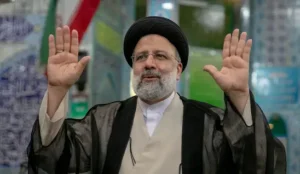Iran Deaths: New Elements in the Troubled Middle East
TRANSCEND MEMBERS, 27 May 2024
René Wadlow – TRANSCEND Media Service
23 May 2024 – On 19 May, the helicopter with President Ebrahim Raisi of the Islamic Republic of Iran, the Foreign Minister Amir-Abdollahian, and the governor of the East Azerbaijan Province crashed into a mountain near the Azerbaijan-Iran border. They had attended a ceremony to mark the start of a joint Azerbaijan-Iran dam project.
President Raisi, a Shiite Muslim cleric was elected President in 2021. He was considered close to the leader of the country, Ayatollah Ali Khamenei and seen as a possible successor to Khamenei who is 84 and has suffered health problems in recent years. Raisi was a “hardliner” and repression of unacceptable ideas, especially on the part of women, continued in full force during his years as President.
The first Vice President Mohammad Mokhber now holds the post of President. Elections are to be held within 50 days according to the Constitution. The death of Raisi will probably have little impact on domestic Iranian policy as most likely someone with similar views will be elected President. More liberal candidates will probably be excluded under one pretext or another. However, the impact on foreign policy may be greater.
Iran plays a role in many of the tensions in the wider Middle East: Israel-Palestine, Syria, Iraq-Kurdistan-Turkey, Yemen, Libya, Afghanistan-Pakistan. One of the most potentially violent situations concerns the Hezbollah armed movement in Lebanon. Hezbollah is strongly supported by Iran but is not under Iranian control. Tensions between Hezbollah and Israeli forces are permanent with exchanges of rockets and drones. Some 100,000 Israelis have moved from the Lebanese frontier area for greater safety. They push the Israeli government to take stronger measures against Hezbollah.
Thus, there is a need for increased efforts for conflict resolution and the start of negotiations in good faith. So far there have been few signs of such negotiations on the part of government representatives. Discussions in the United Nations Security Council are often blocked by the veto and by fundamental differences among governments. There may be a possible role for nongovernmental efforts, but there is no forum to present such NGO proposals for the moment. As representatives of peace-making NGOs, we have to keep our eyes open for new possibilities.
______________________________________
 René Wadlow is a member of the TRANSCEND Network for Peace Development Environment. He is President of the Association of World Citizens, an international peace organization with consultative status with ECOSOC, the United Nations organ facilitating international cooperation and problem-solving in economic and social issues, and editor of Transnational Perspectives.
René Wadlow is a member of the TRANSCEND Network for Peace Development Environment. He is President of the Association of World Citizens, an international peace organization with consultative status with ECOSOC, the United Nations organ facilitating international cooperation and problem-solving in economic and social issues, and editor of Transnational Perspectives.
Tags: Azerbaijan, Ebrahim Raisi, Iran
This article originally appeared on Transcend Media Service (TMS) on 27 May 2024.
Anticopyright: Editorials and articles originated on TMS may be freely reprinted, disseminated, translated and used as background material, provided an acknowledgement and link to the source, TMS: Iran Deaths: New Elements in the Troubled Middle East, is included. Thank you.
If you enjoyed this article, please donate to TMS to join the growing list of TMS Supporters.

This work is licensed under a CC BY-NC 4.0 License.
